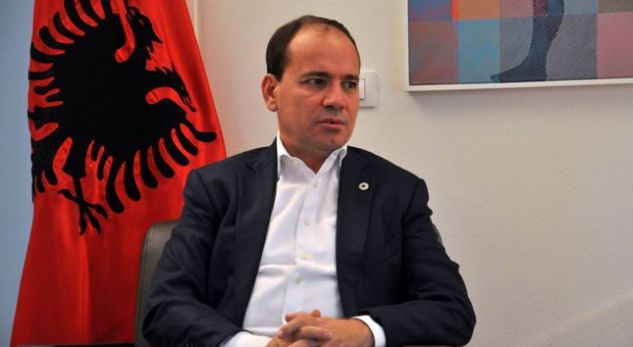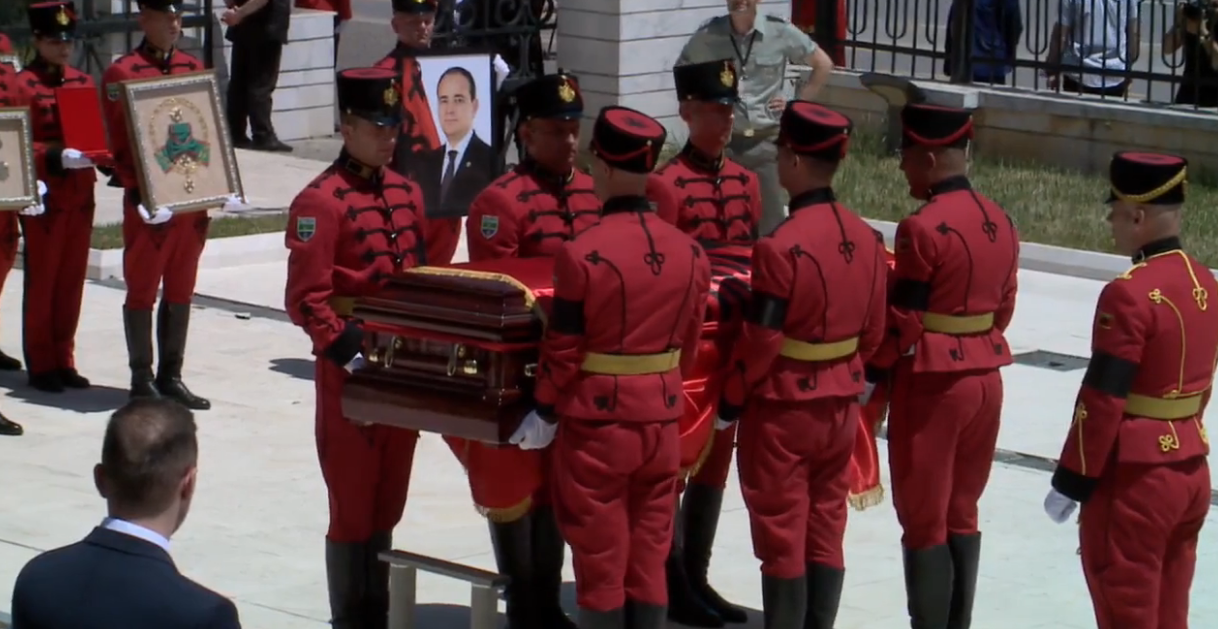[ad_1]
The last farewell was given today to former President Bujar Nishani.
He will be laid to rest in the Sharra cemetery, while being honored with official ceremony at the Presidency.
June 2 was declared a day of national mourning in his honor.
Politicians, senior officials, relatives and well-wishers paid tribute to the president.
Arkmort, former president Bujar Nishani, arrived from Germany at the Morini border crossing in the early hours of Wednesday morning.
From 10:00 the former President’s ark was placed in the central lobby of the Presidency on the second day of.
Today, from 10:00 to 12:00, the official funeral ceremony of homage was held according to the state protocol, to then go to the Sharra cemetery where he will be buried.
The former president passed away on Saturday after being hospitalized for a month in a hospital in Berlin, Germany. He was initially hospitalized at the “Shefqet Ndroqi” hospital in Tirana, as he had post-covid complications.
He was then sent for more specialized treatment, but his health deteriorated due to pronounced pulmonary insufficiency in his lungs.

Profile / Who was Bujar Nishani, the seventh president of Albania
Bujar Nishani was born on September 29, 1964 in the city of Durrës. He completed his higher studies at the “Skënderbej” Military Academy in Tirana, while he completed his postgraduate studies in California, in the United States of America, for “Defense Resource Management”, in 1996. He studied Law at the Faculty of Law, at the University of Tirana, where he graduated as a lawyer in 2004.
He started his professional career as a lecturer at the Military Academy “Skënderbej” in 1988. Then, in 1993 he worked in the Directorate of Foreign Relations in the Ministry of Defense, continuing in 1994 in the Ministry of Foreign Affairs in the Directorate of NATO Relations. n and in 1996 in the Cabinet of the Minister of Defense. In 1997 he returned to the free profession as President of the Euro-Atlantic Military Forum.
In 1991 Bujar Nishani joined the Democratic Party; in 2001 he was elected Secretary of the Democratic Party Branch for Tirana, in 2005, a member of the National Council of the Democratic Party and later a member of the Central Presidency of this party.
In July 2005, Mr. Nishani was elected MP in constituency 34, in Tirana as a representative of the Democratic Party.
From March 2007 to September 2009 he held the portfolio of Minister of Interior, from September 2009 to April 2011 he served as Minister of Justice; to return again in April 2011 as Minister of Interior, until June 2012, when the Albanian Parliament elected him to the post of Head of State in the fourth round with 73 votes in favor and 1 vote against. On July 24, 2012, Bujar Nishani was sworn in as the President of the Republic in the Albanian Parliament.
During his tenure, Nishani focused on the country’s European integration process and the global challenges affecting Albania, such as the immigrant crisis or the fight against Islamic extremism and radicalism. He was elected in 2012, which commemorated the 100th anniversary of the creation of independent Albania and was a one-year celebration.
During the first months of his tenure, his agenda focused on meetings with the Albanian community in the Balkans and the Albanian diaspora to commemorate the 100th anniversary, and to honor and respect all those who fought and sacrificed for the existence of the rights of the modern Albanian state. . His first state visit abroad was to Kosovo, to show that Albania remains committed to assisting in the process of international recognition of Kosovo’s independence.
During his last speech to the United Nations in September 2016 at the 71st Session of the UN General Assembly, he stated that Albania would address these global challenges in close cooperation with other actors. His actions will include increasing humanitarian aid, ratifying the Paris Agreement on climate change and implementing all security commitments.
During most of the state visits abroad, Nishani’s policy was maximally oriented towards strengthening good neighborly relations, citing its support for Kosovo’s participation in all multilateral regional and international activities.
During his tenure, Nishani focused on the country’s European integration process and the global challenges affecting Albania, such as the immigrant crisis or the fight against Islamic extremism and radicalism. During most of the state visits abroad, Nishani’s policy was maximally oriented towards strengthening good neighborly relations, citing its support for Kosovo’s participation in all multilateral regional and international activities.
Bujar Nishani was the husband of Odeta Nishani and the father of two children, Ersi and Fjona Nishani.
top channel
[ad_2]
Source link
















